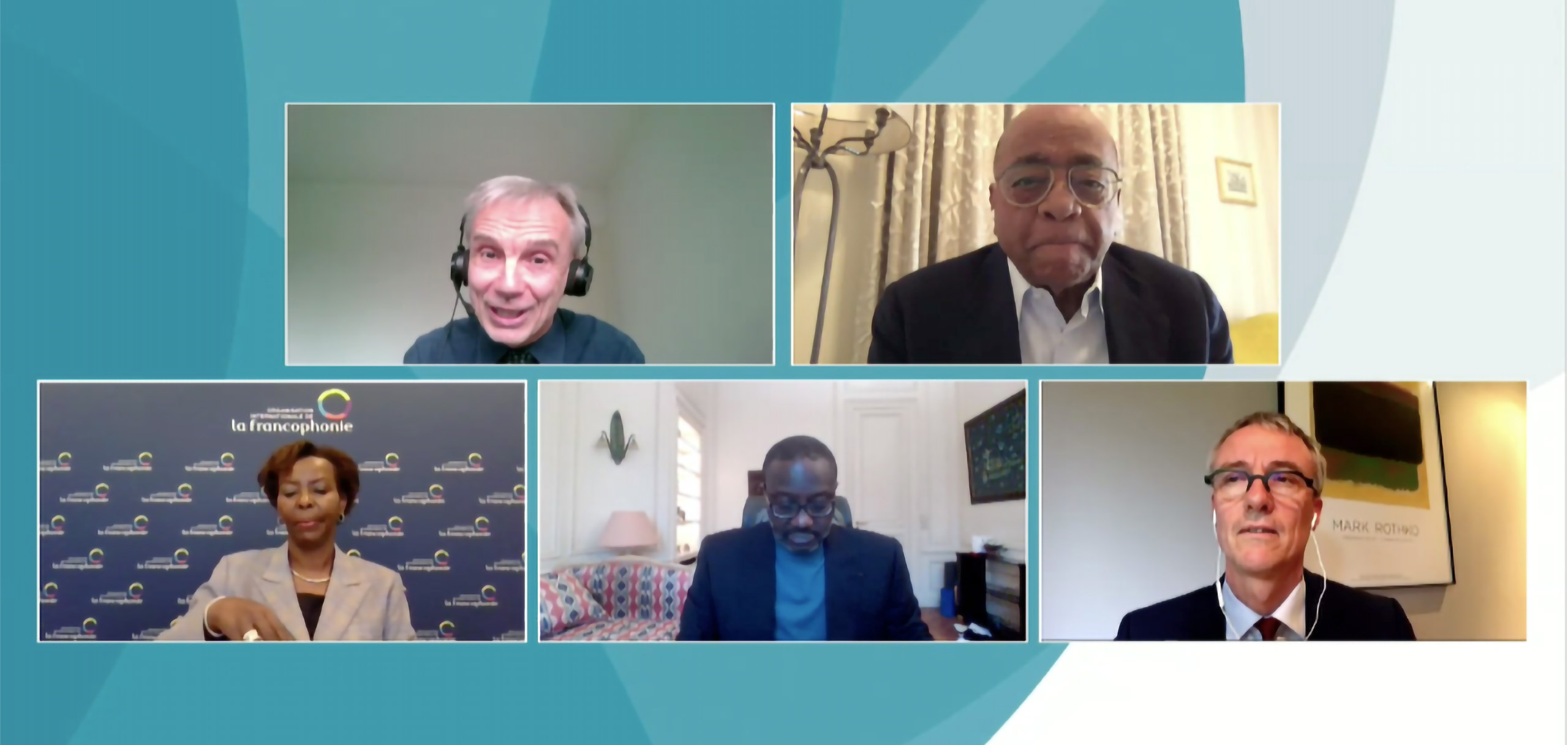Africa’s recovery in a post-Covid world

Screenshot from Paris Peace Forum’s digital live debate, Bolstering Africa’s Response to covid 19.
From left to right, top to bottom: Boris Bachorz,Mo Ibrahim, Louise Mushikiwabo, Tidjane Thiam, Koen Doens
Africa's recovery in a post-Covid world
As announced during the opening ceremony of the Paris Peace Forum (PPF), the economy was one of the key focuses of the event, which as a result of the Covid-19 pandemic has seen a ‘shock like no other’ (Chudik et al., 2020). Working towards global fiscal equality is central to creating a fair and peaceful international community, and thus recovery is paramount.
The debate, Bolstering Africa’s Response to Covid-19, discussed the effects of the pandemic on Africa, focusing on both the epidemiological, sociological, and economic impacts. Speakers on this panel were Boris Bachorz (AgenceFrance-Presse [AFP]), Koen Doens (Directorate General for International Cooperation and Development at the European Commission [DEVCO]), Louise Mushikiwabo (Organisation Internationale de la Francophonie [OIF]), Mo Ibrahim (Mo Ibrahim Foundation), and Tidjane Thiam (African Union [AU]).
On April 15, 2020, the group of 20 leading world economies (G-20) announced that they would provide a temporary debt moratorium for the world’s poorest countries in response to the Covid crisis (Koc et al, 2020), which included Africa. More recent estimates, from October 2020, stated that African states alone are now facing a financing gap of USD 345 billion until 2023 in order to deal with the economic impact of the pandemic (Strupczewski et al, 2020).
A stable economy at risk
Prior to the pandemic, the African economy was looking promising. The economy had stabilized at 3.4% in 2019, and was previously predicted to increase to 3.9% in 2020 (African Development Bank Group, 2020). Estimates proposed that with a sustainable and accelerated structural reform, Africa could be on track to follow in China’s footsteps, a country which has rapidly developed its economy over the last 50 years (Coleman, 2020). However, as a result of the pandemic, the speaker from the AU, Tidjane Thiam, voiced his concerns about “the risk of losing a lot of the progress achieved” (Doens et al., 2020).
Crisis preparedness
A sentiment shared by all speakers on the Bolstering Africa’s Response to Covid-19 panel was how Africa’s history in dealing with epidemiological crises, most recently Ebola, allowed them to handle the outbreak of Covid-19 using existing experiences of practices and procedures. Relative to its large, nearing 1.4 billion, population (Worldometer, 2020), Africa has fared well in controlling the pandemic, with 1.4 million confirmed cases (WHO, 2020).Indeed, the OIF’s Louise Mushikiwabo commended African leaders for acting in time and communicating effectively with the public throughout the pandemic (Doens et al., 2020).
A socioeconomic shift
Although Africa has implemented sufficient procedures to reduce the spread of the disease, there has been a great impact its socioeconomic climate. Mo Ibrahim, founder of the governance and leadership in Africa organization, the Mo Ibrahim Foundation, claimed during the PPF debate that the current financial crisis in Africa is worse than the health crisis. He made reference to the weakening or shutdown of many of Africa’s economic activities, including the tourism industry, export of raw materials, and jobs which require being in public spaces, such as restaurants and parks. He continued to report that this has not only affected the economy but also caused suffering for a lot of people who have lost their jobs or can no longer earn money (Doens et al., 2020).
Debt relief was a prominent topic of discussion during the panel. Director General of DEVCO, Koen Doens, stated that “the right thing to do is have a full mobilization with a broad comprehensive review at a global and multilateral level.” Mr. Ibrahim commented that to move forward Africa cannot continue to rely on exporting raw materials going in to the future, and it must diversify. He highlighted the necessity of the utilization of land and creation of infrastructure in order for the continent to become more self-reliant (Doens et al., 2020).

Article by
Costadina Tsoukala-Steggell

And by
Sarah Marine Surget



